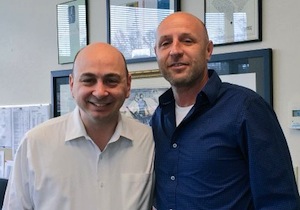Shai Lazer, chief executive officer of Youth Futures, an organization that aids Israel’s at-risk youth. (photo from Shai Lazer)
Earlier this year, Shai Lazer, chief executive officer of Youth Futures – a program supported by the Jewish Federation of Greater Vancouver’s annual campaign, among others – visited Vancouver.
A leader in the Israeli youth-outreach movement, Lazer describes himself modestly.
“I am 36 years old, married with three kids, living in Modiin,” he told the Independent. “My hobbies are reading, traveling around the country and sports. My military service was very meaningful, as was studying in university at the Mandel Institute.”
Lazer’s modesty is deceiving, as he presides over a national organization with outposts in 36 Israeli communities.
Youth Futures endeavors to help vulnerable children, their families and their communities cope with the painful and/or challenging aspects of their daily lives. Started in 2006, Youth Futures works with all demographics of Israeli society, including every manner of Jew, Arab, Bedouin and Druze. Working with more than 12,000 people throughout Israel, Youth Futures designates around 300 professional “mentors” to facilitate the majority of the organization’s outreach. Ultimately, Youth Futures’ mission is “to give every at-risk child in Israel’s geographic and social peripheries the confidence, opportunities and skills to realize their inherent potential.”

But, as Lazer explained, the organization is continually expanding. On his mid-March visit to Vancouver, he spoke with his Canadian counterparts about the direction in which Youth Futures and similar organizations are heading.
“I was received incredibly well,” said Lazer. “I felt there was a real and honest dialogue about what’s currently happening in the field, future endeavors, and meaningful conversation in private and in groups. All in all, the main feeling was that of partnerships.”
Lazer is no stranger to partnerships. Under his direction, Youth Futures’ Kiryat Shmona branch currently benefits from Vancouver (22%), the Jewish Agency (35%), the Ministry of Education (38%) and the local municipality (5%) in partnerships and investment. The organization has grown dramatically since Lazer became director of the program in 2008, and even more since he became CEO. One of his achievements has been securing more government financial backing.
Lazer became a part of Youth Futures when he was in university.
“The program was just started while I was in the second year of my studies in Mandel Institute,” he said. “I was approached to join the staff. I remember thinking that it was an interesting educational concept, and was drawn to the newness – the opportunity to create something new and redefining our approach to helping at-risk children.”
Youth Futures uniquely uses the model of having a mentor reach out to the youth and families in their national outposts. Lazer believes that the idea of the mentor is the key to the success of the organization.
“I define a professional mentor by their ability to learn,” he said. “To be able to stop, have some personal reflection and increase their learning curve – that and passion. Youth Futures chooses this model because it’s the only thing that works.”
Youth Futures has the statistics to show its effectiveness. For example, 78% of the youth showed increased self-confidence and ability to cope and 74% showed improved social skills; its alumni have a negligible school drop-out rate and 84% of them have shown the higher motivation required to qualify for more elite army units or to perform civil service. Lazer maintains that such positive numbers are directly because of Youth Futures’ role in these children’s lives.
“I think it’s because someone believed in them,” he said. “When someone believes in you, your confidence grows and you want to become part of the community. It gives you a sense of responsibility over the world you live in.”
Lazer is adamant that his organization’s model could be used in other countries to help at-risk children and the families and societies that surround them. And Youth Futures is actively looking to expand into North America.
Building on his organization’s momentum, and the foundation of 10 years of solid community outreach, Lazer believes the next decade for Youth Futures will be busy and successful.
“Ten years from now, Youth Futures is still here, constantly expanding to more communities and to new populations – early childhood and high school,” he predicted. “We’re currently in the midst of planning the celebrations of 10 years of Youth Futures and launching the next decade. We’re working on a ‘journey book,’ which will include interviews and showcase all different localities, a film, a big national event to celebrate with our participants and their families, a professional seminar, a reception to be held at the General Assembly of the Jewish Federations of North America in November, and many more. We’re also launching two new initiatives, expanding into intervention with early childhood parents, as well as starting an organization to help our alumni. It’s an exciting time and we’re looking forward to many new things coming our way.”
Jonathan Dick is a freelance writer living in Toronto. His writing has appeared in the Canadian Jewish News, and various other publications in Canada and the United States.

